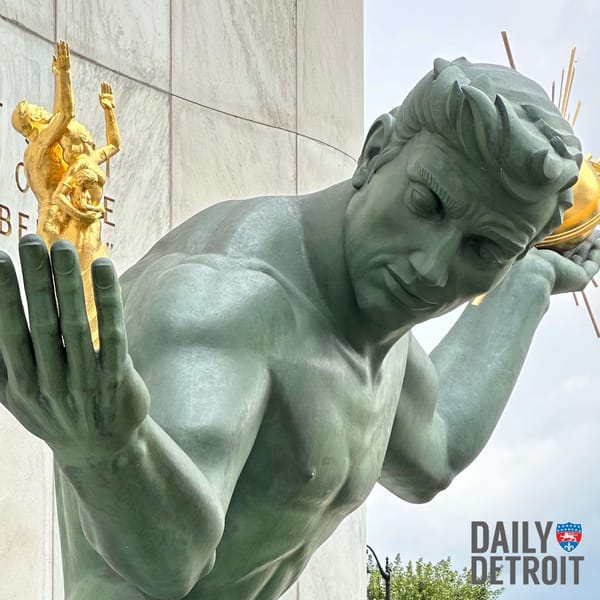When you drive up, it’s a nondescript building off of 11 Mile Road in Royal Oak. The signs aren’t installed yet. The awning hasn’t been changed in color from red to either the black or green of the network colors. But inside, it’s already a hive of activity.
A number of show hosts and Jessica Rangel, who does studio operations, make their way in to check out the in-progress digs, try out the just installed microphones, and chit-chat in the lobby waiting room that still has a stack of art from the previous studio in Ferndale sitting on the floor off to the side.
Some of the pieces go all the way back to when the flagship podcast, IT in the D, was founded and broadcasted in the Russell Industrial Center. But we’ll get back to the history in a minute.
Under construction inside (with one studio already complete) are four new studios for Podcast Detroit, a podcast network that has gone from non-existent a little over a year ago to more than 50 shows of various kinds with many just waiting for space to launch, anchored by the IT in the D show. Two studios with four microphones, two with eight, with one that can also handle the needs of recording live bands for their shows.
“It was our bowling night,” says David Phillips, co-founder of Podcast Detroit, area technologist and co-host on IT in the D of the founding of the podcast.
Bowling night has turned into 400,000-500,000 listeners a week for the flagship show IT in the D, which is basically Detroit’s morning show for all things pop culture and geek. Although they’re Detroit based, there are listeners from all over the country.
But Podcast Detroit is not a one-show pony. There are a variety of genres represented – from areas like beer culture and storm chasing you might not find often on traditional media; to inspirational, music and sports – with thousands of listeners for shows like Detroit Sports Rag by Jeff Moss as well as Forward Down The Field by the guy who sings the song of the same name at Detroit Lions games, Theo Spight.

An Evolution To Revolution
On a June evening in 2013 in a studio in the Russell Industrial Center, after guest-hosting on a couple shows on the now-defunct Raw Radio X online streaming network, the first episode of IT in the D was recorded. Few listened, but that wasn’t the point.
The show started to catch with a crowd looking for media that spoke to them. Folks into information technology, sure, but most of the show is either interesting people from around the Detroit area, or lots of pop culture references.
“We just treat it like we’re just talking at the bar,” said Bob Waltenspiel, a co-founder of the network, and co-host who also does IT sales.
After a couple of years there, the Russell wasn’t fitting their needs. The condition of the building made it “embarrassing” to bring people there, according to Phillips, and they’d have to warn guests what they were getting into before the show as they did their prep drinks at 3rd Street Bar in midtown.
A year ago, thanks to the help and advice of a long-time friend and businessman Neil Nosakowski, they moved to a spot in Ferndale that was in the same building as his companies, Trinet and Activ-8. That building was a few blocks north of 8 Mile near Woodward. That’s when things started to really move.
“After a few weeks there, people started knocking on the door – Hey, can I play? And you have this great studio you’re only using two hours a week,” said Phillips.
With that, they started adding some shows. And that turned to even more shows, after teaming up two months in with Karen Hubbard, known on-air as “K-Hubb,” who brought along some of the shows she had on a nascent online network of her own.
They found there was a group of creative people in Detroit who want to be heard, but didn’t have an easy way to make a podcast, where you just sat down and focused on your show instead of getting caught up in the details of microphones and recording software.

At Podcast Detroit, shows either rent the studio, or rent the studio and an engineer by the hour, and off they go.
For shows that want to take it beyond a personal passion project, they also work with them to get better, using the knowledge they’ve gained the past three years to everyone’s advantage.
“I would love to have shows that get their own standalone advertising deals, or really take off – this is a platform,” said Phillips.
The new studio started recording and broadcasting last Friday, May 20 and should be completely ready in the month. They’ll be able to do four shows at once – a necessity, we’re told, because they have 15 additional shows that would like to start recording as soon as they can accommodate them.
“Dave and Bob are both extremely passionate about the network and open minded. That definitely shows in the variety of shows that wanted to join,” said Rangel. “They’re excited from day one once they see that other people are enjoying living out their passion and realize that they can do the same. Then there is no question of ‘if’ it’s more of a ‘when.’”

What’s Next
Media has been going through a lot of consolidation as of late. It seems every three or four months there’s another story about newspaper, radio or TV cutting X people to deal with the “digital shift” and the fact that often, print advertising levels are being traded for just cents online.
There is media in various formats that seem to be beating the crowd, like the independent site the Charlotte Agenda, started with $50,000 in savings; and Brooklyn-based Gimlet Media, that produces the popular Startup and Reply All podcasts.
The current industry trend is that legacy media is taking it on the chin. There have been thousands of layoffs in an age where most information you’ll find on Twitter first and Facebook has achieved their goal of replacing the major newspapers across the country as the front page of news and daily information for most.
A clue may lie as to how to turn that tide in Podcast Detroit. For them, it’s about authenticity in how they’re making money. If someone wants to advertise, the hosts will need to try it. They’ve found that people today are tuned out by the same old same old. In conversations, it’s clear they see their audience as savvy and that they are there to serve them.

For instance, they do not take political advertising, a lifeblood of many media outlets nowadays, because they know their audience won’t like it.
“We order things before we talk about them. We try them. We would hear about it if we recommended something to people that sucked,” said Phillips.
Their unique version of bowling night in 2013 has turned into a lot more than a few beers and playing their favorite 80s music. There’s now a building of their own. Scheduling. Advertisers. Sponsors.
What’s the strategy going forward? “Smart growth.”
Although they’ve been successful in attracting national advertisers, Podcast Detroit isn’t backed by venture capital or legacy media investors.
“There are only so many hours in a day,” said Phillips, who balances a day job, and a family along with the project. “To me, the challenge is trying to stay ahead of where we need to be without going too far.”










